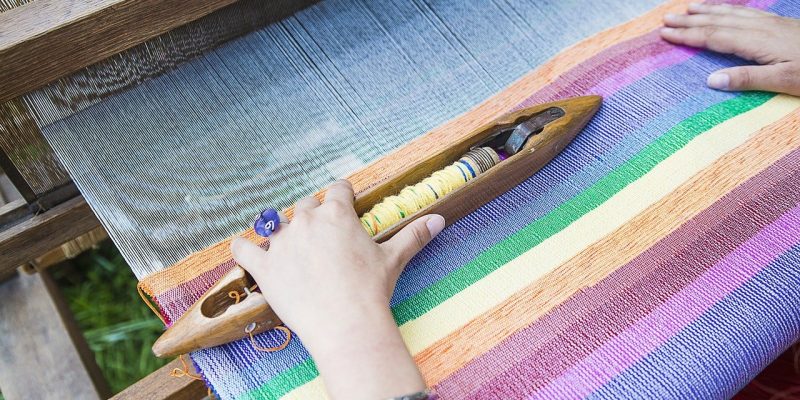Today’s apparel market is intensely competitive. The ongoing need to ‘update’ the variety of items ensures an inevitable shift for many stores to expand the amount of ‘seasons,’ that is, the pace at which the entire stock inside the shop is updated. Asian nations dominate the textile markets of the world. Almost 45 percent of overall exports to the apparel industry come from Asian countries, including leading players such as China, Hong Kong, Thailand, Turkey, Bangladesh, India, and Pakistan.
The increasing dependency of customers in Europe and America on Asia as a low-cost supplier has culminated in very low retail prices for fair quality products. Pakistan is among the top exporting countries for textiles in the country and has been given GSP Plus status by EU countries. Its manufacturing industry has competed on a global market without a strategic plan and funding. In contrast, our major rivals, such as India and China, have used both platforms and tools to capture the international apparel and fabrics market.
Pakistan Clothing and Garment manufacturing Overview
Pakistan is situated in South Asia and has over 212 million people, the 6th most heavily populated country on the planet. Famous for its cricket and the wealth of environmental beauty, Pakistan has also focused on much controversy over the last few decades. Its tourist culture has been seriously disrupted by the degree of insecurity about travel safety in and out of the region. The capital city of Pakistan is Islamabad that has a population of over a million and is regarded as one of the world’s best cities.
This Urdu and English-speaking nation, along with many other languages, has the 26th strongest economy globally and is ranked 4th in the world in terms of its most intelligent population. The scenic habitat of Pakistan shocks many tourists who see this land with dreams, including the Trango Towers, the highest vertical peak in the country, and the Biafo Glacier, the longest glacial structure the world outside the Polar Regions.
Pakistan clothing brands manufacture garments in different designs and types, of the new fashions and quality. The industry is well prepared to manufacture new fashions to meet every part of the planet’s tastes and desires. Top clothing manufacturers in Pakistan and exporters frequently show their crafts and goods worldwide at global exhibits and trade centers such as Paris-London, New York, Tokyo, and Berlin.
What Types of Clothing, Garments, Textiles, and apparel are made in Pakistan?
- Casual Wear in Pakistan
- Shirts/ tops
- Outerwear (Jackets, Coats, etc.)
- Underwear In Pakistan
- Lingerie in Pakistan
- Sportswear
- Uniforms
- Pants
- Formal Wear
- Technical Fabrics
- Children Clothing
- Home and Furniture Textiles
- Yarns
- Labels
- Ready-Made Garments
- Woven goods
Cut and Sew items in Pakistan
In addition to Clothing, Vietnam also makes other items from Fabrics to Cut and sew the industry name of taking a piece of fabric and cutting sewing it into articles, including clothing and bags.
- Bags in Pakistan
- Backpacks
- Briefcases
- Hats
- Caps
- Shoes
- Socks
- Footwear
How to Choose the Right Clothing Manufacturer
Choosing the best clothing manufacturer in Pakistan is a key to the growth of your new clothing company. All the love you’ve given to designing a piece of apparel, all the specifics you’ve imagined to make it exclusive, and the beautiful style you’ve got in mind is only a mistake if you don’t consider a garment supplier who can turn fabrics and finish into a fantasy.
Although important, quality may not be the only criterion to be used by the Pakistan clothing manufacturer. The producer’s manufacturing process, the company’s certification courses, location, and other considerations would affect both the consistency and the finished product’s expense.
Since financial planning is a big move towards beginning your fashion company, you need to make sure that you can manage your preference’s clothing supplier. We’ve put together a simple comparison guide to pick the ideal apparel manufacturers and to help you settle on the perfect one for your growing company.
Minimum Order Quantity (MOQ)
If you deal with an apparel manufacturer, you ought to ask what their minimum order amount is. This implies that you’ll need to buy a certain amount of products in a single order. The MOQ could vary from 100 to 3000 objects, or even more. It’s also very unusual for producers to not have a MOQ. This is essential for you to remember because once you start negotiating with a company and get your first order, and you’re told that you need to purchase 1500 crop top products that you want to produce, you may not be able to finance it.
Also, it isn’t smart to purchase 3000 clothes when you’re not confident you can offer them all. That way, you’re stuck with a surplus of stock that’s hard to sell. In brief, please ensure that the MOQ is achievable with you before you begin to work with the garment manufacturer.
Why choose Pakistan vs. China clothing?
You need to determine whether to collaborate with regional clothing suppliers in Pakistan or with offshore manufacturers. Usually, this involves deciding between suppliers in Europe or factories in Asia. It’s sporadic to find commercially viable textile factories in small nations, and if being locally produced is essential to you, you might be able to make it happen.
Advantages of Pakistan Clothing Manufacturing
We now live in an environment where consumers are becoming highly mindful of the working conditions and the product quality of their clothing.
When it falls to domestic garment producers, you are more inclined to get better quality goods with controlled labor conditions.
Although they’re going to come at a cost, it will be more costly to buy the items from domestic textile suppliers. While you’re paying extra fees for domestic textile suppliers, it’s a smart idea to stress that you’re collaborating with your promotional material for local factories. This will help to improve your brand reputation for customers who are mindful of these kinds of problems.
Shipping periods are yet another great advantage of partnering with domestic garment suppliers. Shipping is likely to be much easier than if you were dealing with overseas garment suppliers. It’s also usually better than when you’re dealing with international suppliers. However, one big drawback of dealing with local textile producers is that there is usually a much narrower range of items relative to overseas manufacturers.
This may not be a matter for you if you are trying to manufacture traditional products, But if you’re searching for something more of a specialty, you could find that offshore vendors are better off.
Clothing, Garment, and Textile Manufacturers in Pakistan
Several overseas clothing suppliers can help you produce items for your market, often at a much cheaper cost than a local manufacturer.
Price is the most significant advantage of using overseas suppliers. They’re often a lot more affordable; that’s why so much apparel is manufactured in China. For several years, clothing companies in China were the most common, with businesses that generate all sorts of clothing for drop and reselling quickly available online. Even so, this is usually because labor practices and workplace conditions are uncontrolled, which is something you’ll have to bear in mind.
It’s even more challenging for you to tour and examine factories. And while offshore factories can produce high-quality garments, this depends on you selecting a reputable maker.
Shipping times are often much longer as goods are delivered overseas. That being said, if you purchase and ship your clothes products yourself, this is not a big concern.
The other advantage is that you will also get a wider variety of products for foreign suppliers – fabrics, models, etc. – and they are more likely to move back to make a trade with you.
Do They Provide Product Samples?
When you have a supplier to produce clothing for your company, you have to make sure you can take measurements before making a significant purchase. This is vital because if anything isn’t perfect, you will make changes before it does. Imagine having the order of thousands of jackets you’ve made, only to discover out they don’t match correctly or that they’ve used the wrong sort of button. The best way of doing this is to bring the subject up soon in your conversation. Many suppliers would be more than willing to supply samples, typically for a small price, so it is up to you to get them all to stick to it from the outset.
Costs and charges for shipping
All it needs is one or two sentences in an email to inquire the supplier if they have any extra charges that you may know about or what their delivery costs and hours are. This is precious information that will help you determine whether you’re dealing with the supplier, so ensure you get it right early.
Will they create your product?
It may sound like an easy issue, but it’s a significant one. Not all manufacturing plants can manufacture all sorts of clothing. For example, outdoor or fitness wear also requires specific components, like waterproof or durable materials. It would help if you were confident that the maker you chose could produce the clothes you desire. Best still, you can try to use a supplier that deals in making the clothes you want. If you begin an apparel company that sells trendy swimwear, you will do better to partner with a supplier with a great deal of experience with your desired products.
Best Clothing Manufacturers in Pakistan
Pakistan is still a developing nation, and the comparatively low workforce costs entice more and more business owners. Nowadays, Pakistan’s clothing and textile industry is growing advanced, and you can discover a broad array of products. This post will mention our best 8 Pakistan’s clothing manufacturers, covering a wide variety of apparel and textiles. We have a concise presentation for each Pakistan clothing factory list, a summary of its essential goods, and certificates.
001 // ZK International
ZK International is a Pakistan-based clothing company with over a decade of experience (20 years). They produce woven and knit clothing.
ZK acknowledges that every large Pakistan clothing brand has started small; therefore, they give limited order manufacturing with a minimum order of only 50 pcs per attire. This small order amount platform is handy for startup companies who still have to specify their ideas and inspiration.
Besides, ZK is also a part of Sedex, which implies that an on-site inspection of ethical principles like health, safety, and labor laws has been carried out.
Certificates
- Sedex
Products
- T-Shirts
- Polo Shirts
- Jackets
- Underwear
- Pants
- Socks
- Hospital Uniforms
002 // Softwood Ltd. (Pvt.)
Softwood (Pvt.) Ltd. is a local clothing company located in Pakistan, headquartered in Lahore. It also has field headquarters in Bangladesh, France, Germany, China, and Brazil.
Softwood (Pvt.) Ltd. is a significant denim supplier and offers a broad array of denim product lines, such as jeans, skirts, and jackets. They as well deliver knit clothing, household textiles, yarns as well as fabrics.
Products
- Knitwear
- Home textiles
- Denim wear
- Yarns and fabrics
003 // FMT (Garments)
In 1999, FMT (Garments) was founded as a family-owned business. It began a 100% export-oriented business and currently provides full-cycle clothing production services, from sample production to shipping.
They provide a wide variety of items for woven and knitwear. There are 12 sewing lines in the plant, with 400 machine tools, with more than 600 workers manufacturing about 180,000 garments every month. And if they are a textile maker, they have their sewing and knitting equipment to independently create the cloth.
Certificates
- Sedex
- WRAP
Products
- Hoodies
- Pajama
- T-shirts
- Ladies one-piece
- Work-wear
- Flannel shirts
004 // HunbulTex
Since the 1990s, HunbulTex has been offering textile trading facilities and developed its manufacturing plants in 2005. The business provides a one-stop approach for importers; it includes cloth design and processing, dyeing, embroidering, and printing. It also controls the entire manufacturing process to make sure efficient operation.
As per their site, they will be launching an e-tracking scheme in the coming years.
Certificates
- ISO 9001:2008
- ISO 14001:2004
Products
- Designing
- Fabric Supply
- Dyeing and Printing
- Embroidery
005 // Creative Apparel (Pvt). Ltd.
Creative Apparel (Pvt). Ltd was set up in 2003. The company provides its goods and services to international labels such as Zara, Matalan and Bershka, and many others.
They excel in knitwear, particularly hoodies for adults and children, as well as knit pants. As one of Pakistan’s best knitwear companies, they have a 30,000m2 factory area that enables them to have a considerable capacity and manufacture about 18,000 garment units each day.
They also possess numerous international qualifications, like BSCI, Sedex, and WRAP.
Certificates
- PRIMARK
- Sedex
- INDITEX
- BSCI
- WRAP
- C-TPAT
Products
- Hoodies
- Kids knitwear
- Trousers
- Knit Jacket
006 // Escorts Advanced Textiles (Pvt.) Ltd.
Escorts Advanced Textiles (Pvt.) Ltd. is a Pakistani garment firm providing its customers a wide range of types of materials and fabrics.
They already have 10 + years of experience in the production of knitted, woven, and non – woven fabrics appropriate for a wide variety of goods, whether intermediary raw materials or finished goods.
Various design textiles are developed by them, such as anti-ballistic fabrics, heat and thermal safety fabrics, and lightweight materials. Consequently, their materials can be used for everyday clothing and formal wear, like ballistic resistant coats and helmets.
Certificates
- ISO 9001:2008
- DQS UL
- Oeko-tex standard 100
Products
- Anti-ballistic materials
- Heat and thermal control fabrics
- Emergency response materials (apply for personal protective garments)
- Security materials for motorcycles
- Heat & thermal protection materials
- Light & strong materials
007 // MAS Digital Textile
MAS Digital Textile was founded in 2006 to offer alternatives for digital textile printing. Although there are many clothing and textile industries in Pakistan, there is a shortage of textile printing specialists, which includes specific complicated procedures, including shimmering, vibration, and blurring.
Following other cloth factories, the printing industry should pay careful attention to environmental specifications.
High-end digital printing skills are also used to increase textile items’ efficiency, such as active digital printing, which improves clothing and textiles’ output, like washing effect and friction speed.
Products
- Printing of garments and textiles
- Digital printing of clothing
008 // Sky Industries
Sky industries began to produce textile goods in Pakistan in 1990 and to export in 2002.
Unlike other garment factories, Sky Industries doesn’t rely on fabric or clothing items. Alternatively, they primarily manufacture bed sheets, kitchenware, table covers as well as sofa covers.
Besides, three quality checks are usually carried out during the production process to ensure quality, such as analyzing grey fabrics, the second inspection and mending of woven fabrics, and the final piece-to-piece analysis before packaging.
Products
- Table and sofa cover
- Kitchen items
- Towels
- Bed-sheets
Final Thoughts about manufacturing clothing In Pakistan
Pakistan may be called an underdeveloped region. But in certain areas, including arts research, it’s not just outdated. The apparel industry in Pakistan is by far the most cost-effective market. Pakistan’s fashion world is by far the fascinating shift in today’s era. We hope you’ve found our guide to finding the best clothing manufacturer in Pakistan helpful. If you have questions, do let us know in the comments section below.





3 thoughts on “How to Find Pakistan Clothing, Textile, and Garment Manufacturers // Top 10 Clothing Suppliers In Pakistan List”
I am a regular visitor, how are you, everybody? This paragraph posted on this website is truly good. Frank Lek Blake
In recent decades, Bangladesh has emerged as a powerhouse for apparel manufacturing. The country’s strengths are low labor cost and vast workforce. Advance technology and High-quality products have attracted many major global retail brands to Bangladesh. The country is a leading textile exporter with a turnover of USD 38.73 Bn. Also, the vertical capacities of Bangladesh, which helps global brands to ensure more transparency and coordination in their supply chain. The textile industry of Bangladesh is growing rapidly with the bulk order of value-added items of big global brands.
One clear trend here is that China, even though it is the largest exporter of clothes and textiles, is losing market share to the rest of the world. We guess that political uncertainty and concerns about the trade war with America have a lot to do with that decline. As we’ll talk about later, fashion executives are making it a priority to diversify away from China.